Kunming to Dali, the Tiger Leaping Gorge and Shangri-La – 2 weeks, 900km
China overwhelms and assaults the senses. It’s also a land of contradictions that has you groping for air from the terrible truck exhaust one minute, and gasping in awe at a 10,000ft deep gorge the next. In the past 2 weeks we’ve been through bike-touring hell and back, but are now perched on the edge of the Tibetan Plateau, giddy with excitement at what the next 2,000km and 4 weeks will bring. We sit in blissful high-altitude comfort in the mythical town of Shangri-La surrounded by initial glimpses of Tibetan culture, and the joy of being in the mountains makes it especially hard to reconcile this new wonderful China with the same China we escaped from only 5 days ago.
Downtown Kunming was a sanctuary of relative quiet, great people, cleanliness and good food, and its comfort lulled us into false bliss. But as soon as we biked out of that bubble, the endless lines of trucks, eye-stinging dust, road slime and noxious black exhaust bitch-slapped us back to the reality of cycling on China’s roads. (Southwestern) China, at first glance, is disgusting. Actually it’s disgusting at the second and third glances too. True, China is endowed with an abundance of natural beauty, but most of it is obscured beneath a superficial film of filthy toxicity that envelopes the landscape in its foulness. And it is on this surface that the bike tourer, for better or worse, has to travel.
We had received conflicting reports about the road from Kunming to Dali and so we had no idea what to expect. Would it be the peaceful back road that a fellow bike tourer promised, or would it be full of trucks and dust as we were warned by a Kunming resident? Unfortunately, it was the latter, and our moods soured before we even lost sight of the city. China’s roads are filthy on their own, but combined with the endless rain that seems to follow us everywhere we cycle, the dirt turns into a viscous sludge that coats your bicycle, legs, and feet in a toxic slime, and after 5 minutes we were covered. A few days later, we both woke up with itchy, bumpy rashes all over our legs.
The slime-coated roads are also dangerously slippery. On the second day, my rear tire slid out on a rain-slicked downhill curve that sent my bike and my body grating across the asphalt for 30ft into the other lane, removing both layers of skin and a layer of dignity. Luckily, the truck coming uphill was moving slowly and had plenty of time to stop. The driver waited until I had peeled myself and the bike off the road and roared onward, blasting black exhaust in my shocked face as he passed. And as we sat on the side of the road mending my bloody legs, not a single car, bus, or truck paused or stopped to ask if we needed help.
Perhaps they were too busy to stop, engrossed in their own self-interest, because that is exactly how Chinese people seem to drive; without a thought to anyone or anything else on the road, each person racing to pass the car in front, expressing their god-given right to own the roadway. As in the US, the price of the car seems to inversely relate to the driver’s level of patience. This self-importance would be bad enough on its own, but when mixed with a complete lack of skill it creates an endless series of near-misses that leave us cringing. The driving is so bad that it’s almost comical, until you remember that it’s your life they’re threatening. We’ve been passed by drivers on curves only to watch them almost slide out from excess speed, and have had to pull off the roadway because some asshole in an expensive car needed to pass right now. But that is the problem with cars, they create a layer of insulation around the driver, dehumanizing the outside world and removing any sense of kinship one might have felt for those around.
The terrible driving is accompanied by an over-liberal use of the horn that must supposedly serve to counter their lack of skills. By the end of the day, our heads ring with the sound of thousands of horns that range from the simply annoying “I’m passing you” toot to the “Get the FUCK out of my way” eardrum-blast from trucks and buses passing on blind curves. It has become such an irritant that we are trying to have “Honk if you have a small dick” printed in large Chinese characters to affix on the back of our bikes in the hopes of reducing the number of calm-shattering horns we have to endure.
Many Chinese understand and respect bike touring however, and some of the honking directed at us is actually friendly – it’s just impossible to distinguish from the background noise. Oftentimes, as cars passed, a camera would snake out of the window and capture our struggle. And when we arrived at tourist destinations, we’d often find that the spectacle of us elicited just as many shutter clicks as the one they’d come to see. The wonderful camaraderie we’ve encountered at every stop is an important reminder of the inherent goodness in people – something that’s easy to forget when you’re in the traffic. And despite an initial layer of aloofness, every Chinese person we’ve come to know has been friendly, warm, and beyond helpful.
The rampant development that has overtaken this part of the country has one very negative side-effect for the cyclist: thousands and thousands of trucks that foul the air of every road with their thick, black, lingering exhaust. The pollution was so bad between Kunming and Dali that it made both of us nauseous and Alex so sick that he went a day without eating and vomited several times on the roadside. But despite these absurd traffic conditions, we passed several dozen Chinese cyclists doing their own short bike tours; Kunming to Dali, Dali to Lijiang, seemingly unaffected by the fumes. They were always friendly and happy to see other cyclists on the road. We even got hugs from two guys heading our direction.
In almost every small town and village that we passed we were harried and chased by angry guard dogs, small and large, that seemed hell bent on preventing us from lingering in their territory. Thankfully, the most ferocious were chained up, but the sudden eruption of angry barks on the quiet roadside was enough to make us jump out of our saddles. Dogs may be man’s best friend, but they are bike tourers worst enemy. The dogs’ attacks violated our sense of hierarchy in the world (they’re dogs after all) and caused us to concoct dark, twisted fantasies about violently slaughtering all the Chinese dogs whose paths we crossed. We both discovered the unfortunate depths of our dark sides during these episodes.
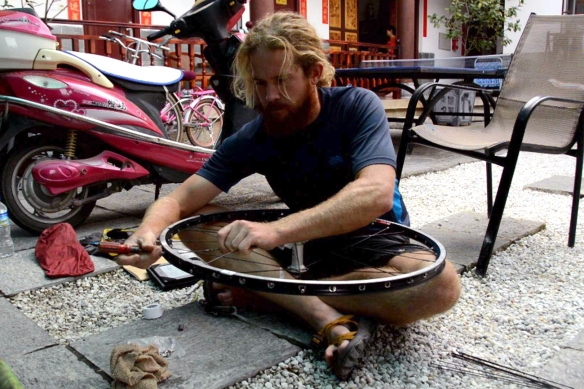
this rim was shipped from Beijing to Kunming, then carried 5 days on the back of my bike to Dali, where I built my first wheel
We arrived in Dali in the pouring rain, amidst the swarming, touristy chaos of National Week. Unbeknownst to us, we had landed in one of the most popular tourist destinations during the country’s biggest holiday; Oops. But after a beer, the good folks at Bad Monkey brewery found us a great place to stay. We met several fellow bike tourers and travelers and life was good again. We traded stories of the road and sympathized with each other’s various trials and horror stories over many plates of food, grateful to be amidst the company of others who understood our massive eating needs. We are eternally grateful to Fabian and Daya, a Swiss couple heading south, who let us borrow their warm-weather gloves, mittens, cycling pants, and waterproof shoe covers – items which have already proven their worth in the past few days.
We left Dali on October 2nd, inspired once again by the generosity and warmth of our fellow human beings, and with the cautionary words of our friend Cam Moore, “Go north, dudes!” propelling our legs northward toward the Tibetan Plateau. Because we are leaving this, the highest and northernmost part of our route, until mid October, there is a real danger of getting caught in snowstorms or the road becoming impassable due to heavy snow. But we are both gluttons for punishment and secretly relished the opportunity to pit ourselves against the snows and cold of the Himalaya, and so we ignored Cam’s advice to take a bus north, opting instead to cycle through the Tiger Leaping Gorge to Shangri-La.
In retrospect, this decision in itself ensured that we would endure further suffering at the hands of the multitudes of Chinese drivers plying the tourist trail from Dali to Tiger Leaping Gorge, and has led us to question our somewhat sadistic tendencies. The traffic was bad, worse than we expected, and as we neared the road to Lijiang, we were forced to thread our way through traffic jams up to 10km in length, made worse by the impatient holiday-goers that parked their cars two and three deep, preventing any oncoming traffic from moving forward.
At Tiger Leaping Gorge the Yangtze River cuts a path between two 5600m (18000ft) snow-capped mountains, creating a 3000m deep gorge that you can ride a bicycle through. Obviously there was no way we could skip this, even if it meant fighting tour buses the whole way. There are some sights in this world that are too impressive for even the Chinese tourism industry to diminish, and watching the entire volume of the Yangtze violently smash its way through the gorge in an impressive display of nature’s fury is one of those sights. It was terrifying and awesome and we spent an hour mesmerized by the maelstrom. Back on the road, we did end up fighting lines of tour buses and cars, until halfway through the gorge – when our whole world changed.
A massive landslide earlier in the year had ripped out a section of the road, rendering it impassable to vehicles – but pedestrians and bicycles could still scramble across on the narrow path. This was a huge change, and it took a few minutes for the true implications of this roadblock to sink in. No cars. The landslide was, in effect, a portal through which we entered a new China, one distinct from that of the other Chinas we had already experienced. In this new China, the lines of tour buses, caravans of expensive cars, and roar of traffic were replaced by silence. Pure, peaceful silence. For the first time in 3 weeks of biking, we could carry on a conversation without being interrupted by the blast of a horn or the scream of a strained diesel engine. We celebrated our newfound freedom by biking in the middle of the road – and partly to avoid plunging off the guardrail-less road into the Yangtze 500m below. This new environment allowed us to fully appreciate our surroundings for the first time, and as our eyes traced gullies and cracks in the soaring rock faces all the way to the clouds, the sheer immensity of the place sank in, and we felt humbled and small, but huge in spirit. We had arrived.
Since then, life has been very good and we grinned and sang through the nonstop rain, the lack of food, the endless passes and the lack of air. The landscape and vegetation changed dramatically after the gorge, and the hot, humid forests of southern Yunnan were replaced by cold, dry forests of pine, fir and spruce, alpine scrublands and high altitude grasslands. If China can do anything, it can do big, and for the first time, the scale of the landscape dwarfed that of any human development – we were now truly in the Himalayas.
And then for the next three days we were climbing (and falling and climbing and falling and climbing). But unlike so many of the others on the trip, these climbs were enjoyable. The cool mountain air provided a comfortable buffer against the sweat of uphill pedaling, and without the truck exhaust we could actually breathe and taste the crisp air. Yaks now outnumbered cattle, and picturesque mountain villages populated by elaborately clothed ethnicities replaced the ugly concrete cities of the south. The agricultural practices of these valleys matched Vietnam’s terraces in beauty and style, and dwarfed them in scale. Rice and maize terraces climbed 1500m up the steep mountainsides, apple, pomegranate, pear, and walnut orchards lined the roads, and goats roamed the hills. Yet despite all of this rich fecundity, it was nearly impossible to find food and we subsisted on little more than instant noodles, sugary drinks, and cookies for 2 days.
We often camped on the tops of passes, furthest from the villages, but not removed from their touch. One morning, we emerged from our tent in a forest clearing to find a Yak herder grinning at us. Making horn gestures on the sides of his head with his fingers, he asked if we had seen his herd. We signed back that no, we hadn’t seen them, but we could hear their bells off in the distance. The friendly old man was too deaf to hear his own animals. We gave him the rest of our bottle of whiskey.
We are traveling in China without a contour map, and in the spirit of this adventure we have avoided looking at our route in too much detail, preferring instead to discover by doing. After the first few huge climbs, we began to play at guessing our elevation. The rain at the tops of the passes was cold, many of the trees were stunted, and it was getting harder to breath. Had we hit 3300m (11000ft) yet? But by the middle of the third day we were exhausted from lack of food and the endless climbing. We were cold from the nonstop rain and pedaling uphill was getting even harder.
We began to have doubts about our ability to make it to Chengdu by the beginning of November, a schedule that necessitates us averaging about 100km a day. If we were struggling so much at 3000m, how would we fare at 5000m (16500ft)? And what the hell would the weather be like way up there? Would we be freezing? It wasn’t until we descended into Shangri-La through Tibetan villages of thick, earthen-walled homes and massive wooden drying racks, exhausted and starving, that we discovered what we had just biked. Without knowing it, and with no acclimatization, we had climbed from 1600m (5200ft) at Tiger Leaping Gorge to over 4200m (13800ft) at the highest passes.
We leave Shangri-La tomorrow armed with yak wool hats, a pound of bacon generously gifted to us by the kind Canadian owners of Somewhere Else Cafe, and a renewed confidence, eager to pit ourselves against the mountains and snow of the Tibetan Plateau (I may regret saying that soon). As Cam warned us, “it may just be a man fest from Oct 20 onward”, but the Tibetan culture we’ve seen so far has piqued our curiosity and warmed our hearts, and we yearn for more. And if the stories we’ve heard from other bike tourers and travelers are true, then the friendliness and warmth of the Tibetan people will help us out in any major trouble we run into. So far, with every kilometer we’ve biked north, the people have become friendlier, the air cleaner, and the nature more beautiful, and it’s only going to get better. Yet again, a whole new China lies just down the road.

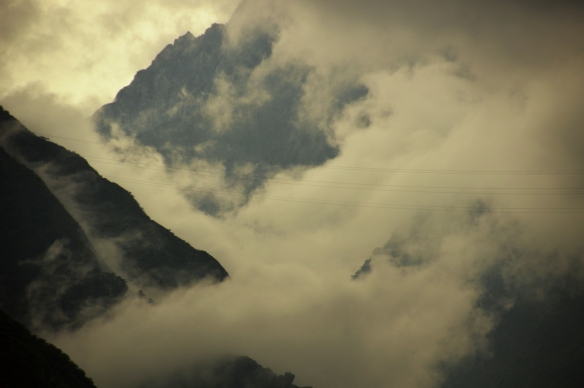
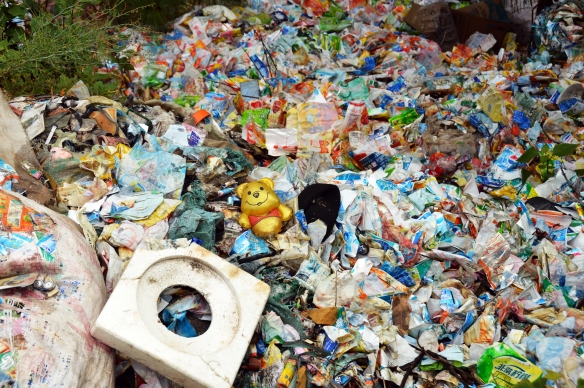
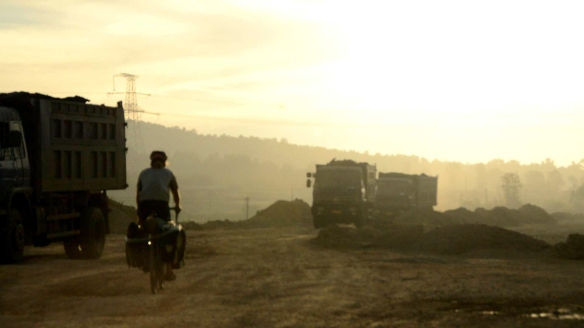
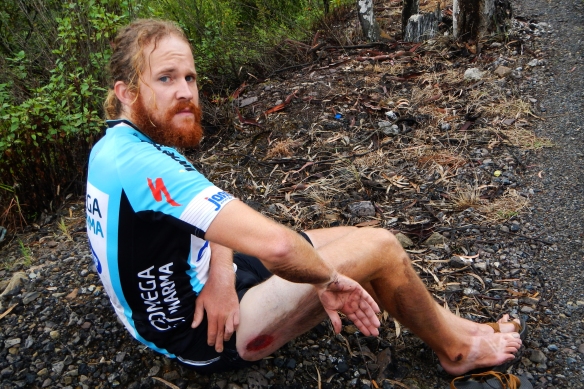
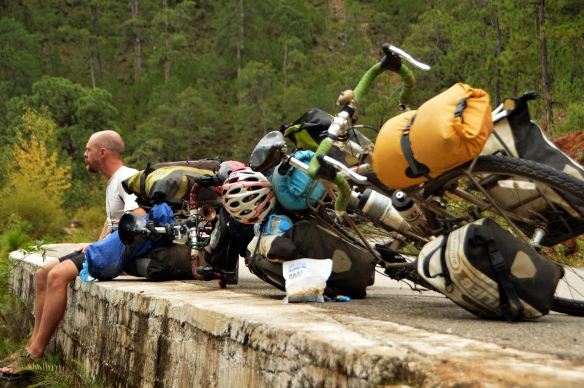
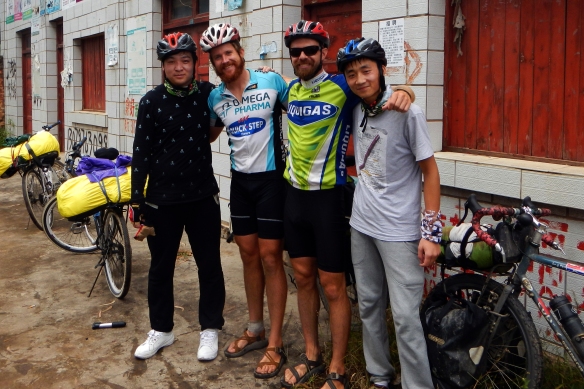
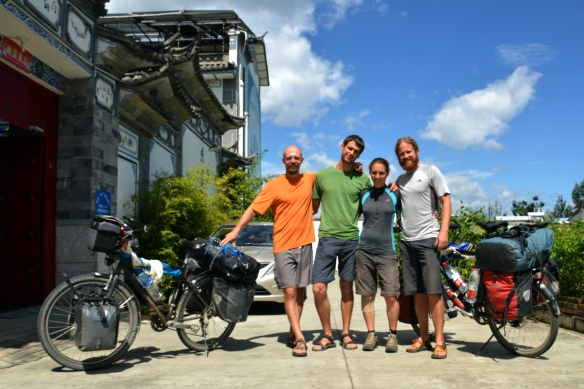
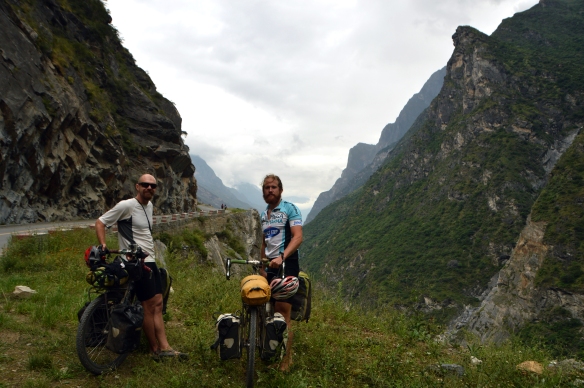
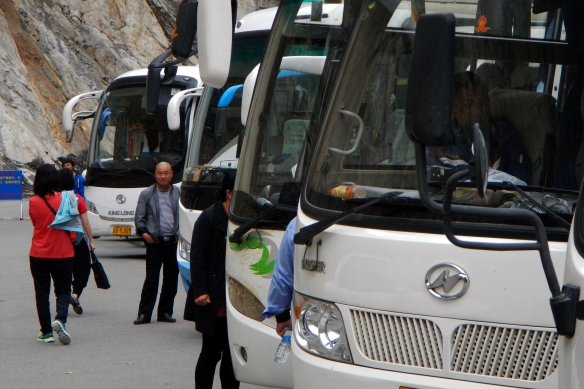
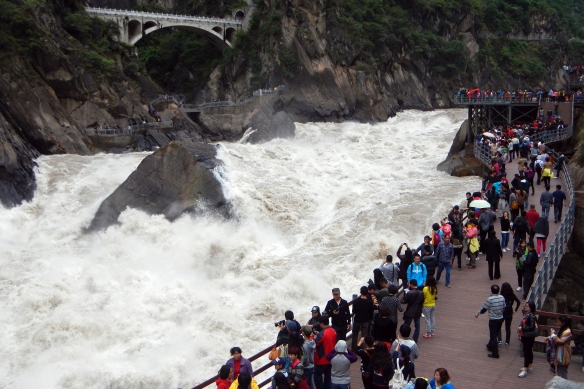
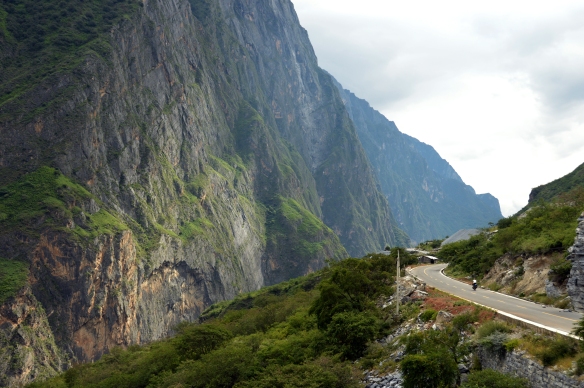
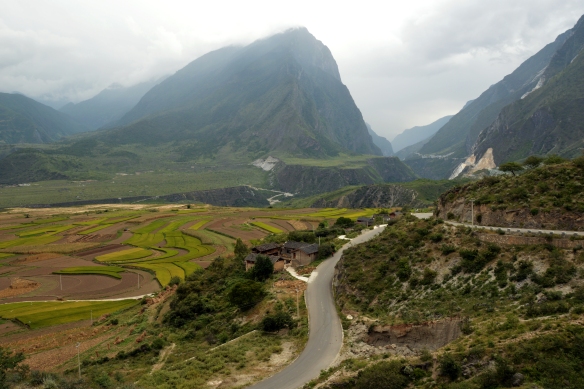
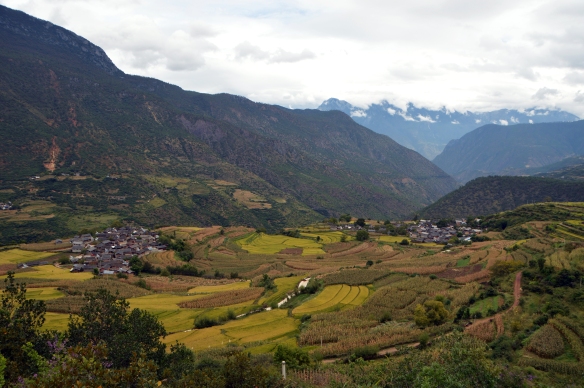
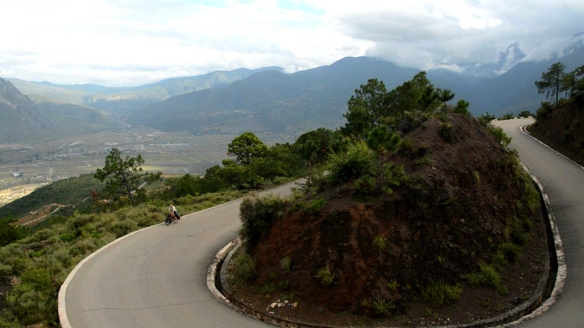
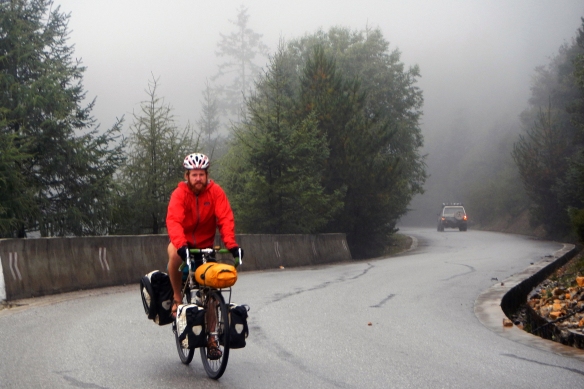
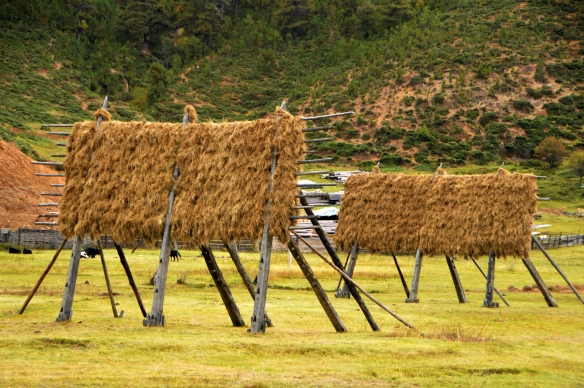
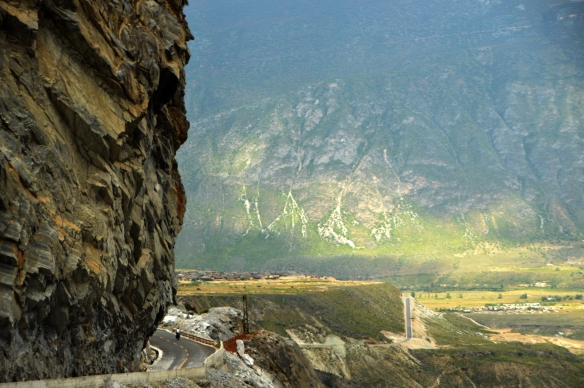
Just amazing in both horrifying and inspiring ways. We’re hoping this next leg is all good. Safe travels.
Thanks! All good so far – well with some minor mishaps and a bit of scariness, but that’s to be expected. New update within the week!
When you visited us, we didn’t even realize you were dealing with road rash injuries. 太厉害了!You guys are hard core!! Remembering you as you roll.
I’m sure you can imagine, but that bacon proved to be nearly the best gift a bike tourer could ask for. Five nights of bliss-filled dinners, not easily forgotten, and now we’ve got plenty of good karma to pass along. And for future: Yading is very much worth the visit – if you’ve got a week the outer Kora route is incredible and there’s no one on it. Bring warm clothes and good food. Take care you two!
Glad you were blessed by the bacon and the tip — we took the other fork the last time up that way, but definitely work the explore. We eagerly await your pics!
I have no doubt that you two will succeed on this crazy adventure and I am just wishing I was 50 years younger (I could do it too). Can’t wait for your next post.
Hang tough,
Buddy
Hey Buddy, thanks for the encouragement! Jump on a plane and join us in India, forget the 50 years! Hope you and Anne enjoyed your trip to Gulf Shores.
You made my day of petty worries about money, health, and politics disappear, at least for a few minutes. Ride on you burley pair of bad-assed boys, and keep writing.
With much envy and respect.
Doug
Thanks Doug! Wish we could say we don’t worry about those things too, but at least being on the bike puts them in the background. Hope you’re still pedaling too (is there a Schuknecht/Loviska family bike tour in our future?). Stay well and thanks for the encouragement!
Really enjoying this blog and all your adventures Rob!
Hey Steve! Sorry I missed you and the rest of the family at Sarah’s wedding. Hopefully we’ll all be able to get together in the near future. The next blog post should prove interesting; 5 days hiking around 20,000ft passes all while suffering from altitude sickness. Fun Stuff.
…make that 20,000ft mountains and 16,000ft passes
I can mail you guys some South American pate if you guys are really desperate!
The canned-steamed “pork” we ate on the hike around Yading made even that pate seem appetizing! Slivers of meat encased in globs of congealed pork fat. ugh.